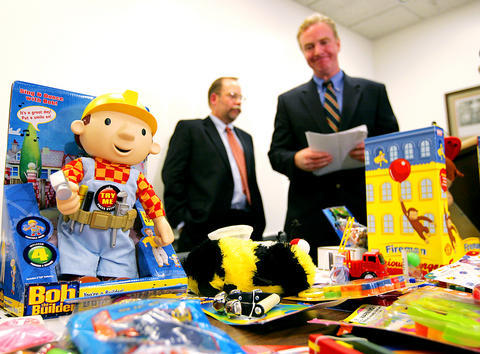US store shelves are still stacked with dangerous toys, a consumer group warned in a study published on Tuesday, despite a spate of recent scares that prompted mass recalls of items made in China.
Inspectors from the US Public Interest Research Group (PIRG) "still found trouble in toyland on store shelves this fall," the group's Consumer Program director Ed Mierzwinski said in a statement presenting its annual toy safety survey.
The group found dozens of examples of toys and jewelry with high levels of lead and other poisonous chemicals, dangerously strong magnets and parts small enough to choke a child if they were swallowed.

PHOTO: AP
Almost 73,000 children under the age of five went to emergency rooms, and 20 children died, due to toy-related injuries in 2005, it said, citing data from the US Consumer Product Safety Commission (CPSC).
Another group, the California-based Center for Environmental Health, last week reported finding various children's products with illegally high levels of lead, including children's backpacks, rain ponchos and vinyl lunchboxes.
It said nine of 100 toys bought from various stores had high lead levels. The nine products were all made in China, the world's top toy exporter.
A spate of overseas safety recalls this year targeted Chinese-made products ranging from seafood to car tyres, with toys in the spotlight in recent months.
The warnings ahead of the Christmas shopping season have stoked calls for stronger oversight by the CPSC.
However, acting CPSC chairwoman Nancy Nord has defended the agency's efforts, saying it has recalled tens of millions of products this year.
Mierzwinski said the CPSC was under-resourced. Congress is considering boosting its budget from US$63 million a year to more than US$100 million and increase punishments for violations.

LONG FLIGHT: The jets would be flown by US pilots, with Taiwanese copilots in the two-seat F-16D variant to help familiarize them with the aircraft, the source said The US is expected to fly 10 Lockheed Martin F-16C/D Block 70/72 jets to Taiwan over the coming months to fulfill a long-awaited order of 66 aircraft, a defense official said yesterday. Word that the first batch of the jets would be delivered soon was welcome news to Taiwan, which has become concerned about delays in the delivery of US arms amid rising military tensions with China. Speaking on condition of anonymity, the official said the initial tranche of the nation’s F-16s are rolling off assembly lines in the US and would be flown under their own power to Taiwan by way

OBJECTS AT SEA: Satellites with synthetic-aperture radar could aid in the detection of small Chinese boats attempting to illegally enter Taiwan, the space agency head said Taiwan aims to send the nation’s first low Earth orbit (LEO) satellite into space in 2027, while the first Formosat-8 and Formosat-9 spacecraft are to be launched in October and 2028 respectively, the National Science and Technology Council said yesterday. The council laid out its space development plan in a report reviewed by members of the legislature’s Education and Culture Committee. Six LEO satellites would be produced in the initial phase, with the first one, the B5G-1A, scheduled to be launched in 2027, the council said in the report. Regarding the second satellite, the B5G-1B, the government plans to work with private contractors

‘NARWHAL’: The indigenous submarine completed its harbor acceptance test recently and is now under heavy guard as it undergoes tests in open waters, a source said The Hai Kun (海鯤), the nation’s first indigenous defense submarine, yesterday began sea trials, sailing out of the Port of Kaohsiung, a military source said. Also known as the “Narwhal,” the vessel departed from CSBC Corp, Taiwan’s (台灣國際造船) shipyard at about 8am, where it had been docked. More than 10 technicians and military personnel were on deck, with several others standing atop the sail. After recently completing its harbor acceptance test, the vessel has started a series of sea-based trials, including tests of its propulsion and navigational systems, while partially surfaced, the source said. The Hai Kun underwent tests in the port from

MISSION: The Indo-Pacific region is ‘the priority theater,’ where the task of deterrence extends across the entire region, including Taiwan, the US Pacific Fleet commander said The US Navy’s “mission of deterrence” in the Indo-Pacific theater applies to Taiwan, Pacific Fleet Commander Admiral Stephen Koehler told the South China Sea Conference on Tuesday. The conference, organized by the Center for Strategic and International Studies (CSIS), is an international platform for senior officials and experts from countries with security interests in the region. “The Pacific Fleet’s mission is to deter aggression across the Western Pacific, together with our allies and partners, and to prevail in combat if necessary, Koehler said in the event’s keynote speech. “That mission of deterrence applies regionwide — including the South China Sea and Taiwan,” he